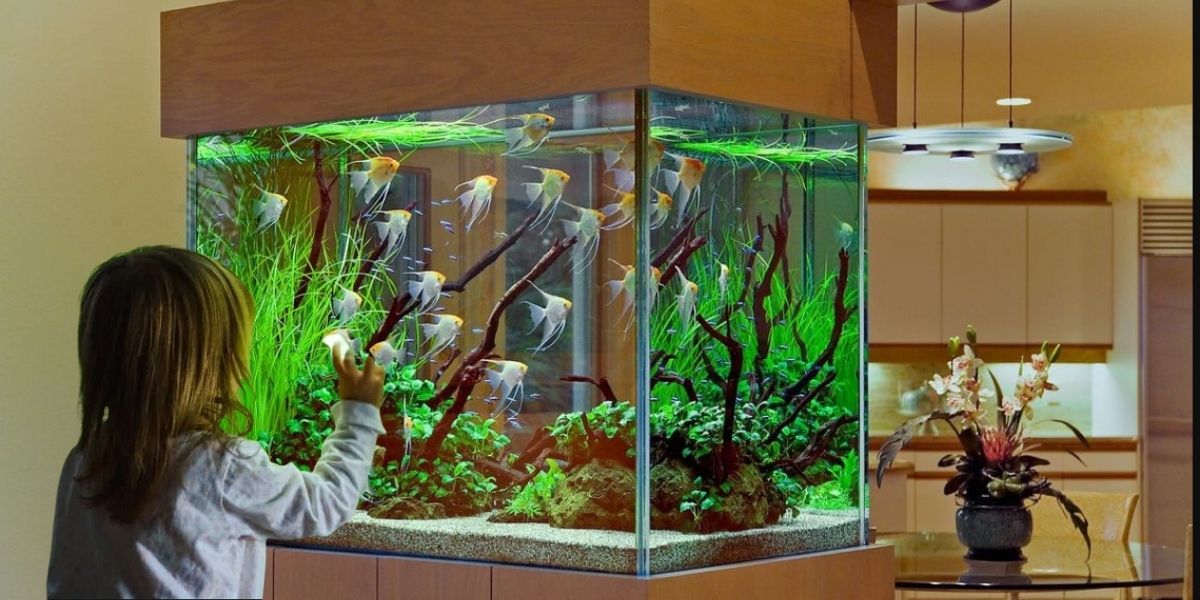Fish tanks are not only a beautiful addition to any home but they are also known to have a calming and relaxing effect on individuals. But have you ever thought if they are good for toddlers? In this article, we will explore the benefits and risks of having fish tanks in homes with toddlers.
Introduction
The beauty of a fish tank can attract individuals of all ages, and many parents may consider introducing a fish tank in their homes to enhance the aesthetic value of their living space. However, when it comes to toddlers, parents may have concerns about the safety and health impacts of having a fish tank around their active little ones.
The Benefits of Fish Tanks for Toddlers
1. Fish tanks can teach about marine life
Introducing a fish tank in the home of a toddler can be an opportunity to teach them about marine life. Toddlers are naturally curious and introducing them to fish can help them learn about different species, their habitats, and behaviors.
2. Fish tanks can be calming for toddlers
Fish tanks are known to have a calming effect on individuals, and toddlers are no exception. Watching fish swim can have a relaxing and soothing effect, which can be especially beneficial for toddlers who may have difficulty settling down for naps or bedtime.
3. Fish tanks can be a source of entertainment
Toddlers can find fish tanks highly entertaining, and the movement and colors of the fish can capture their attention for hours. This can be particularly useful for parents who need to divert their toddlers’ attention away from other tasks.
4. Fish tanks can help to develop empathy and responsibility
Introducing a fish tank to a toddler can be an opportunity to teach them about empathy and responsibility. Caring for fish can help toddlers learn about nurturing and the consequences of neglect, which can be valuable lessons for their personal development.
The Risks of Fish Tanks for Toddlers
1. Toddlers can be at risk of injury
Fish tanks can be heavy and fragile, and toddlers may not understand the risks associated with handling or climbing on them.
Toddlers can also be at risk of injury from sharp objects in or around the tank, such as gravel or decorations.
2. Fish tanks can pose a drowning risk
Toddlers are naturally drawn to water, and fish tanks can be an appealing attraction. However, fish tanks can pose a drowning risk if toddlers accidentally fall in or try to reach into the tank.
It is essential to take appropriate safety measures, such as keeping the tank covered or out of reach.
3. Fish tanks can be a breeding ground for bacteria
Fish tanks can be a breeding ground for bacteria if they are not maintained correctly. Toddlers may put their hands in the water or try to drink from the tank, increasing the risk of exposure to harmful bacteria.
Proper maintenance, such as regular water changes and cleaning, is necessary to keep the tank clean and safe.
4. Fish tanks can cause allergies
Fish tanks can be a source of allergens, such as fish food, waste, or mold. Toddlers may develop allergies or respiratory issues from prolonged exposure to these allergens. It is crucial to monitor any symptoms and seek medical attention if necessary.
Conclusion
Aquariums can be an excellent addition to any home, but parents need to weigh the benefits and risks before introducing them to homes with toddlers. While fish tanks can provide an opportunity for learning, relaxation, entertainment, and development, they can also pose risks such as injury, drowning, bacterial growth, and allergies. Proper maintenance and safety measures are necessary to ensure that fish tanks are safe and enjoyable for toddlers to have around.
Safety Tips for Introducing Fish Tanks to Toddlers
To ensure the safety of toddlers around fish tanks, here are some tips to consider:
- Keep the tank out of reach or covered to prevent accidental falls or drowning.
- Ensure the tank is properly secured and stable to prevent it from tipping over.
- Use non-toxic decorations and plants in the tank.
- Keep the water clean and maintain proper hygiene by washing hands before and after handling the tank or its contents.
- Monitor any allergic reactions or respiratory issues that may arise and seek medical attention if necessary.
By following these safety tips, parents can introduce a fish tank to their homes and enjoy the benefits it provides while keeping their toddlers safe.
Frequently Asked Questions
1. Can toddlers develop allergies from fish tanks?
Yes, toddlers can develop allergies from fish tanks due to exposure to allergens such as fish food, waste, or mold. It is crucial to monitor any symptoms and seek medical attention if necessary.
2. Can toddlers get sick from bacteria in fish tanks?
Yes, toddlers can get sick from bacteria in fish tanks if the tank is not maintained correctly. Regular cleaning and water changes are necessary to keep the tank clean and safe.
3. How can parents teach toddlers about marine life through fish tanks?
Parents can teach toddlers about marine life by discussing different species of fish, their habitats, and their behaviors. They can also read books or watch videos about marine life and visit aquariums to learn more.
4. Are there any benefits of having a fish tank in a toddler’s room?
Yes, having a fish tank in a toddler’s room can provide a calming and relaxing environment, which can help them settle down for naps or bedtime.
5. How can parents prevent toddlers from climbing on or touching the fish tank?
Parents can prevent toddlers from climbing on or touching the fish tank by keeping it out of reach or covered. They can also explain the risks associated with handling or climbing on the tank and supervise their toddlers around the tank.

